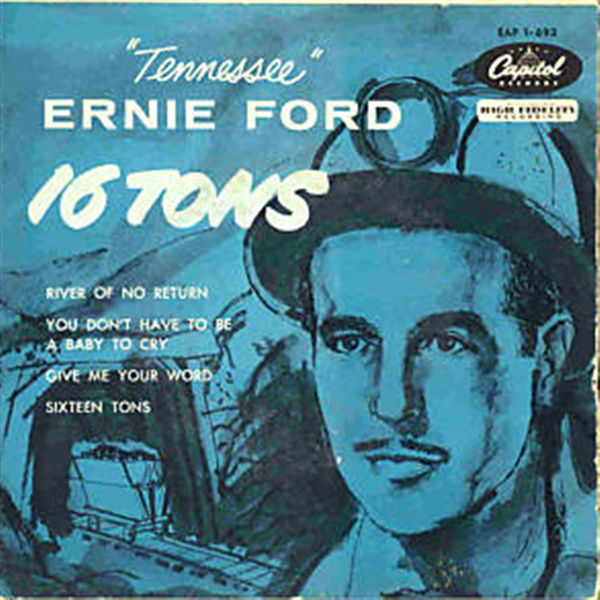Singing Hard Times: Working Life in Five Songs

Published in Portside in November 8, 2018
Work was once carefully defined with nine to five with the option of overtime. Life seemed set. The fifties were a docile decade. The music of this time featured lilting lyrics but soon different days were in store.
Merle Travis’s Sixteen Tons grim coal miners’ song was recorded in 1946. Travis used his brother John’s phrase, “sixteen tons and what do you get, another day older and deeper in debt.” Merle’s father often said, “I can’t die, I owe my soul to the company store.” Merle’s song did not feature the dreamy romantic ballads so popular during that time. His tune seemed like a dirge. Tennessee Ernie Ford’s somber version became number one on the Billboard’s chart in 1955. Frankie Lane’s version was popular but only released in western Europe. Elvis Presley sang Sixteen Tons in concerts but never included it in a record. The Weavers sang this selection. Their compelling harmony combined lively spirit and idealistic politics. Ford’s mournful quality was missing. Tom Jones chose Sixteen Tons for his album, The Green, Green Grass of Home. Stevie Wonder celebrated his Motown spirit when he recorded this song in his album, Down to Earth. Johnny Cash ‘s highlighted Sixteen Tons in Johnny Cash is Coming to Town. On March 15, 2015, Ford’s version was included in the Library of Congress National Registry
Allen Reynolds, a song writer and producer wrote the forlorn lyrics of Five O’ Clock World. The tune was somehow upbeat. The Vogues were the singing group. This 1965 lyric stated: “Up every morning just to keep my job, gotta find my way through the hustling mob.” Like Arthur Miller’s Willie Lowman we only have a vague sense about the singer’s work. This song finished as the whistle blew and the day’s shift ended. Then, a brief freedom begin with “a long-haired girl who waits, I know to ease my troubled mind. In the shelter of her arms, everything’s okay. She talks and the world keeps slippin’ away. And I know I can go on, when every other reason is gone.”
Work was controlled, directed and managed by someone else. Another popular song described the women’s side of this work divide. Dolly Parton wrote the angry tune and lyrics in 9 to 5. Unlike the male leads of Sixteen Tons and Five O’ Clock World, Dolly sang with gusto. “Working nine to five what a way to earn a living. Barely getting by with all taking and no giving. They just use your mind but never give you credit. It’s enough to drive you crazy if you let it.” This 1981 popular song was featured in the movie of the same name. There is a possibility that this movie may updated for today’s world.
Shelia Easton, from Scotland released a song with the same title, just months before Parton’s hit. For the United States market the title changed to Morning Train: Nine to Five, with a passive female waiting endlessly for her man to come home. The words featured a traditional sensibility not present in other selections. Florrie Palmer was the song writer.
Tracy Chapman examined work differently. In her 1988 debut album, she became famous with her wistful song, Fast Car. “You got a fast car. I need a ticket to anywhere. Anywhere is better.” Chapman told about a check out girl in a convenience store. Both the singer and her partner lived in a shelter. What were her plans for “something better?” Realism ruled. Her fictional father had a history of drinking “he lives with the bottle that’s the way it is. “Drinking was also important to her companion who spent most of the time at a bar. In this song, Chapman still believed in a fast car to arrange for a getaway. These words made the happy future seemed elusive. Chapman’s reality was different. She graduated from Tufts University in 1987. She performed at Nelson Mandela’s seventieth birthday party. Her music expressed a black and feminist viewpoint.
Current songs emphasized fantasy, dreams and desires. Today’s tunes seemed to have less interest in work and its discontents. How can we sing new songs about life today,. How can our music reflect our lives. When can we create our power?
[Constance H. Gemson is a New York City based writer and an active member of the Professional Staff Congress ]